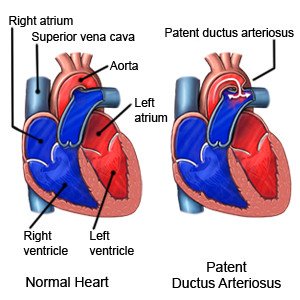Patent Ductus Arteriosus in Children
Medically reviewed by Drugs.com. Last updated on Sep 23, 2025.
AMBULATORY CARE:
Patent ductus arteriosus (PDA)
is an abnormal opening between the aorta and the pulmonary artery of your child's heart. In the womb, your baby's blood goes around his or her lungs through a normal opening called a ductus arteriosus (DA). The DA allows your baby to get oxygen from his mother's blood. Shortly after birth, the DA closes on its own because blood needs to go to the lungs to get oxygen. When the DA does not close as it should, it is called a patent (open) ductus arteriosus.
 |
Health problems PDA can cause:
Some of the blood from the aorta flows back into the pulmonary artery. This extra blood flow causes the heart to pump harder than normal to send enough blood and oxygen through the body. The increased blood flow could lead to heart failure. It can also increase pressure in your child's lungs.
Common signs and symptoms:
A small PDA may not cause any signs or symptoms. A larger PDA may cause any of the following:
- Heart murmur (abnormal sound heard through stethoscope)
- Shortness of breath after crying, eating, or being active
- Trouble breathing at rest
- Blue lips and fingernails after crying, eating, or being active
- Problems eating and gaining weight
- Colds and lung problems that happen often
Related medications
Treatment options
The following list of medications are related to or used in the treatment of this condition.
Seek care immediately if:
- Your child has shortness of breath after crying, eating, or being active.
- Your child's lips and fingernails turn blue after being active.
Call your child's doctor if:
- Your child has problems eating and gaining weight.
- Your child has a fever.
- Your child has chills, a cough, or feels weak and achy.
- You have questions or concerns about your child's condition or care.
Treatment for a PDA
depends on the size of the PDA. Your child's PDA may not need treatment if it is small and is not causing symptoms. Your child's healthcare provider may wait to see if the PDA will close on its own. The provider may close the PDA even if your child does not have any symptoms. This helps decrease the risk for infection. Your child may need any of the following:
- Medicine, such as heart medicine or diuretics, may be given if your infant or older child has heart failure.
- Transcatheter duct occlusion may be used to close your child's PDA if it is small. One or more tiny coils are put into the PDA to close it. This treatment is usually used for older infants and children.
- Surgery may be needed for infants and older children if the PDA is large.
Follow up with your child's doctor or cardiologist as directed:
Write down your questions so you remember to ask them during your visits.
© Copyright Merative 2025 Information is for End User's use only and may not be sold, redistributed or otherwise used for commercial purposes.
The above information is an educational aid only. It is not intended as medical advice for individual conditions or treatments. Talk to your doctor, nurse or pharmacist before following any medical regimen to see if it is safe and effective for you.
Learn more about Patent Ductus Arteriosus
Treatment options
Further information
Always consult your healthcare provider to ensure the information displayed on this page applies to your personal circumstances.
